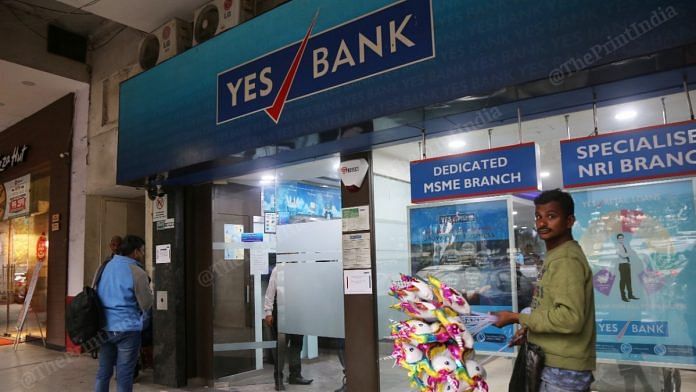New Delhi: Global financial services firm UBS had flagged concerns over the credit portfolio of Yes Bank, the private lender placed under a moratorium Thursday, as early as 2015.
In a report dated 7 July 2015, UBS had pointed out that Yes Bank had the strongest growth in loans to potentially stressed companies.
“We believe Yes Bank is most vulnerable to a prolonged weak credit cycle and consensus may not be ready for a sharp increase in the company’s credit costs,” UBS said, downgrading Yes Bank’s stock to a “sell”. Typically, brokerage firms recommend whether investors should “buy” or “sell” a stock, and at what price.
The report was drawn from data on collaterals available with the Registrar of Companies — the data concerned around 100 potentially stressed companies covering loans of around $100 billion — and sought to understand the lending and exposure pattern of banks.
Its conclusion — Yes Bank had a relatively higher share of loan approvals to potentially stressed companies as compared to some other private and public sector firms.
“Yes Bank had the highest share of term loans backed by unlisted shares and current/movable assets (33 per cent),” the report said.
Also Read: Yes Bank crisis shows why India needs a resolution mechanism to act before it is too late
‘Vulnerable to large corporate defaults’
The report had also pointed out that the sum of loans approved by Yes Bank for this list of potentially stressed companies was at 125 per cent of the bank’s net worth. It added that the bank was more vulnerable to large corporate defaults.
At the time, Yes Bank had hit out at UBS and filed a complaint with SEBI, asking the capital markets regulator to undertake a detailed investigation against the company.
Recent events indicate that UBS may have been prophetic in its report. The RBI Thursday announced the superseding of the bank’s board and placed it under a moratorium for 30 days.
Even as the central bank and the government urged against panic, depositors’ withdrawals were capped at Rs 50,000.
It flagged the “steady decline” in the financial position of the bank as well as “serious governance issues and practices in the recent years” to justify its decision.
On Friday, the RBI announced a draft reconstruction plan, wherein state-owned State Bank of India will acquire a 49 per cent stake in the bank and the entire board and top management will be replaced.
The role of the older management, including that of former managing director and chief executive officer Rana Kapoor, is likely to be probed by the RBI. In a briefing Friday, Finance Minister Nirmala Sitharaman said the government had asked the RBI to probe what caused the problems of this “size and magnitude at Yes Bank”, besides looking into the role of people involved in running the bank.
Kapoor had stepped down in 2019 after the RBI refused to give him an extension citing corporate governance issues and mismanagement. He was succeeded by Ravneet Gill, who made multiple but failed attempts to raise capital.
Also Read: Yes Bank crisis: Has Modi govt done enough to fix financial sector woes to revive economy?




There is a need to review failure in discharge of duties and responsibilities on the part of RBI department of banking supervision when any bank fails. Failure of many banks at regular intervals is a sign of weak supervision and lack of timely action. RBI should be asked to make funds available for meeting the liabilities of current, saving and fixed deposit account holders when any bank folds up like this. Only then RBI will start acting responsibly! Once depositors are sorted, RBI can then handle restructuring, merger, bankruptcy leisurely at its own pace.
Otherwise, government should have a scheme for saving bank and fixed deposit accounts where funds deposited will be fully backed by the government (hence, risk free). The government will set the interest rates (being risk free -rates are expected to be little less than rates offered by commercial banks) and collect the funds. These accounts will be operated by the designated banks just as PPF accounts are operated. This way, individuals will be able to allocate desired portion to completely risk free deposits and remaining to risky deposits (but protected by Deposit Insurance up to 5 lacs). This will also free government of the periodic headache of managing such mess.